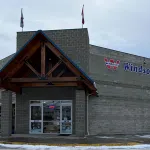
Provincial short-term rental regulations take effect May 1, more details announced
With the new regulations to limit short-term rentals in B.C. coming online next month, the province has released further details.
The Short-Term Rental Accommodations Act takes effect May 1, for communities across the province, including Vernon and Kelowna.
The new rules are as follows:
- The Principal Resident Requirement: Short-term rentals can only be offered in the principal residence of a host, plus one additional unit, secondary suite or lane way home/garden suite on a property in a community with a population greater than 10,000 people. This requirement will function province-wide for communities, though local government will still be able to use more restrictive bylaws.
- Strata hotels and motels that have been operated in a manner similar to a hotel or motel before December 8, 2023, and meet select criteria moving forward, will be exempt from the Principal Residence Requirement.
- Non-conforming use of property will no longer apply to short-term rentals,
- If a business licence is required by the local governments, then short-term rental hosts will be required to display a valid business licence number on their listing. Local governments will be able to request a platform remove listings that do not display a valid licence.
- Short-term rental platforms will be required to share data with the province.



